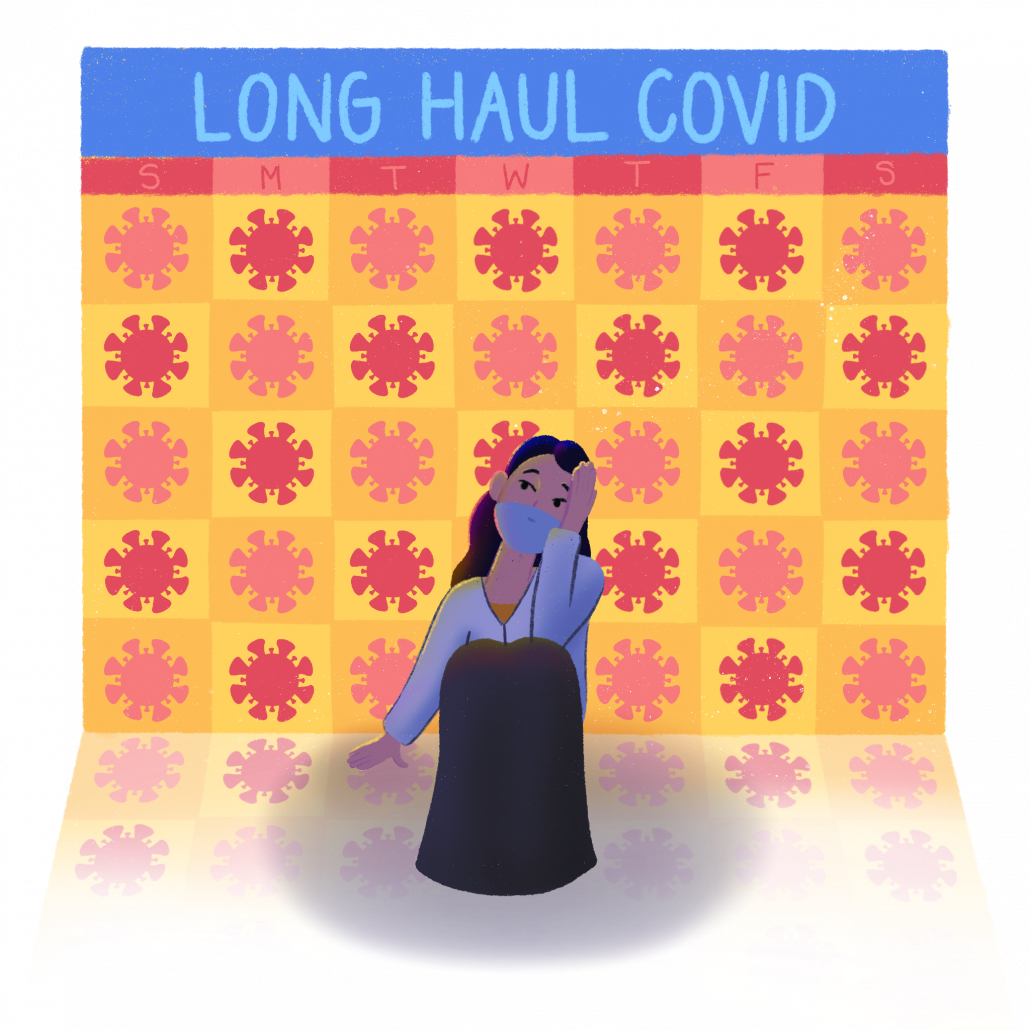Students, alumna fight ‘long COVID’

Eva Furlani thought she had put the coronavirus disease behind her after she recovered in March 2020. Within a month, her normally thick hair started falling out rapidly.
“I feel like everyone’s had that nightmare before, where you’re just in the shower and hair falls out,” said Furlani, a sophomore majoring in writing for screen and television. “Then when it happens to you, you’re like ‘Oh my god,’ what did someone do to my shampoo?”
Furlani’s hair loss only began to wane around seven months after she tested positive for the coronavirus. She and her doctor later deduced that the likely cause was a mild presentation of “long-haul COVID.”
The Centers for Disease Control defines “long” or “long-haul COVID” as health problems that continue or appear four or more weeks following a coronavirus infection. Symptoms can range from mild to severe and may include heart palpitations, fatigue, loss of smell and taste and new or worsening cognitive and mental health issues.
A Keck School of Medicine of USC news release stated that, similar to national levels, nearly 10% of Keck Medicine’s coronavirus patients have experienced long-haul COVID. Although college-aged young adults have low fatality and severe coronavirus illness rates, the Keck release noted that the majority of long-COVID cases at Keck were within the ages of 20 to 40.
For USC alumna Morgan Stephens, contracting the coronavirus disease was supposed to be a brief interruption to her fast paced life as a journalist. However, it developed into a life-changing ordeal that stretched on for eight months.
Stephens tested positive for the coronavirus on Nov. 6, 2020; she had graduated with bachelor’s degrees in political science and journalism that May.
A month after her initial illness, she began to experience a variety of new severe medical symptoms including internal and external tremors, blood pressure issues, shortness of breath, insomnia, extreme anxiety, accute brain fog and autonomic nervous system issues.
Stephens said some of the most debilitating were brain fog: She struggled to comprehend movie plots or conversations, had a constant sense of vertigo and severe mental distress. Her symptoms were most intense for the first four months.
“It was a situation where it wasn’t day by day, it was minute by minute, and if it wasn’t minute by minute, it was moment by moment, to survive,” Stephens said.
After graduating, Stephens worked as a production assistant for CNN, a “high speed, high stress” position. The transition from her active career to pausing her work and young adult life due to illness was devastating, she said.
“That has been something very difficult to grapple with, as someone who was very much goal oriented [and] career focused, getting sick to where I couldn’t cognitively comprehend conversations,” Stephens said. “I felt like my whole identity had been taken away, in addition to my health.”
Chief Health Officer Dr. Sarah Van Orman said in a student media briefing June 15 that treatment for people suffering from long-haul COVID is “multidisciplinary,” and could include referrals to different specialists such as cardiologists, psychologists or physical therapists depending on the individual’s symptoms.
For treatment, Student Health may refer patients to the Keck Medicine COVID Recovery Center, which is designed to develop a specialized medical care and management plan for those experiencing long-haul COVID symptoms.
“There isn’t something that will immediately reverse the effects, but, rather, we’re looking at what the symptoms are and then, usually from a rehabilitative approach, how [we can] help get that person back to better functioning,” Van Orman said.
Stephens has been a patient at the Keck Recovery center since February 2021. She receives treatment from USC neurology, cccupational therapy and physical therapy.
“[The Keck Recovery center is] really searching for a solution or at least some kind of palliative care; where they can at least just treat the symptoms and give me a little bit of relief,” Stephens said.
Although Furlani said her symptoms were fortunately not medically dangerous or physically painful, and were not severe enough to impair her daily function, she still felt self-conscious about her physical appearance. Combined with uncertainty about the cause or implications of her symptom, the experience caused significant harm to her mental health during the last academic year.
“I thought [I] got through [getting the coronavirus]. I thought I did the hard part,” Furlani said. “And I think for me as a young person, a young, healthy person, actually having [the coronavirus] wasn’t the hard part. The hard part was the effects.”
Long-haul COVID cases such as Stephens’ can become severe enough to impair basic everyday function, according to The Department of Health and Human Services and the Department of Justice, who jointly released new guidelines in late July that recognized long-haul COVID as a federally protected disability under the Americans with Disability Act. Stephens filed for and received two months of disability status from the state.
Senior Director of the Office of Student Accessibility Services Debbie Jih said OSAS is well equipped to support students requesting long-haul COVID disability support.
Students with debilitating forms of long-haul COVID who contact OSAS can expect an assignment to an OSAS disability specialist and accommodations that may include testing accommodations, residential or dining accommodations, classroom accommodations and advocacy on behalf of the student to professors, Jih said.
Although long-haul COVID has received increased recognition in recent months, Jih said the lack of research and awareness surrounding the symptoms could be frustrating to those experiencing it.
“It’s important to listen to the student, hear them out on their unique experience because I think given how new long-COVID is, it could be easily dismissed by peers or others in the community,” Jih said.
Furlani said that before she became aware of long-haul COVID, not knowing the cause of her hair loss contributed to a chronic sense of panic and worry about her health. Furlani said that having a diagnosis was extremely validating.
Stephens said that even though she had a diagnosis, the lack of research and available treatments for long-haul COVID continues to an added medical and mental challenge.
“When no one knows how to help you, even people in the ER, even specialists, even your primary care physician, you begin to lose hope. And you also begin to question yourself,” Stephens said. “And that’s a really tough place to be when you’re already suffering so much with physical symptoms, so it’s extremely difficult and it’s extremely anxiety provoking.”
According to Jih, the novelty of long-haul COVID will not be a barrier to effective disability support, as OSAS is experienced with students who have debilitating forms of a variety of chronic illnesses and injuries.
“We’re very knowledgeable about looking at the functional limitations or symptoms, and then seeing how they could be addressed through all these different types of accommodations that we have,” Jih said.
Furlani is optimistic that she is recovering. Stephens is still receiving extensive treatment but is seeing improvements.
“I feel like I’m finally kind of gaining ground again and getting a semblance of normalcy being back at work, and having a little bit less symptoms these days,” Stephens said.

